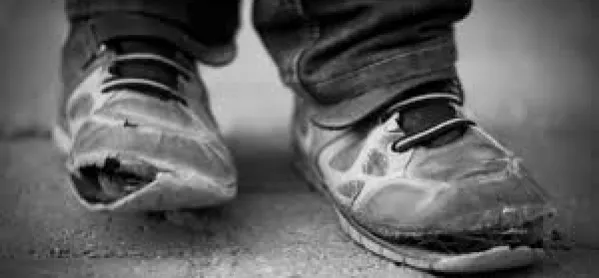- Home
- Schools now a ‘fourth emergency service’ for poor pupils
Schools now a ‘fourth emergency service’ for poor pupils

Schools have become an "unofficial fourth emergency" service providing food, clothing and social care for poor and vulnerable children after a decade of cuts, a headteacher leader has warned.
The Association of Schools and College Leaders has published new figures today showing the extent to which schools are coping with pupil poverty.
Its survey shows nine in 10 state-funded secondary schools have provided clothing for pupils and almost half had washed clothes for them.
Opinion: 'We must eradicate pupil hunger, here's how'
Quick read: Teacher survey uncovers distressing levels of poverty among pupils
Quick read: Tears as free breakfasts arrive in schools
ASCL's general secretary, Geoff Barton, warned that a decade of austerity had broken the social fabric of the nation, leaving schools struggling to cope with the consequences.
He urged politicians to overcome their “Brexit fixation” and invest properly in schools, college and other public services.
And one headteacher of a school in a northern coastal town described how some of her pupils are living in homes with no heating, walking in with holes in their shoes, and living on one hot school dinner a day.
A survey of more than 400 secondary school heads – representing more than one in 10 schools in England and Wales – has revealed a “rising tide of pupil poverty”.
Ninety-six per cent of those questioned said the extent of pupil poverty has increased over the past few years.
The ASCL survey showed:
- 91 per cent of schools heads who responded provide items of clothing for pupils suffering from high levels of disadvantage.
- 75 per cent put on breakfast clubs.
- 71 per cent provide pupils with sanitary products.
- 47 per cent wash clothes for pupils.
- 43 per cent provide food banks or food parcels for pupils or their families.
The survey also found that:
- 92 per cent said there have been cutbacks in local authority support for vulnerable families and young people in their area over the past few years.
- 98 per cent have experienced difficulty in accessing local mental health services for pupils who need specialist treatment – with most attributing this difficulty to a combination of service cut backs and increased demand.
- Nearly all respondents – 405 – reported increased demand for in-school mental health support, with commonly cited reasons being the pressures linked to social media, poverty, cuts to local services, and exams.
Mr Barton said: “A decade of austerity has wreaked havoc with the social fabric of the nation and schools have been left to pick up the pieces while coping with real-term funding cuts.
“They have become an unofficial fourth emergency service for poor and vulnerable children, providing food and clothing and filling in the gaps left by cut backs to local services.
“Politicians must end their fixation with Brexit and work together to build a new sense of social mission in our country. We simply must do better for struggling families and invest properly in our schools, colleges and other vital public services.”
Writing for Tes last year, he warned that more and more schools were supporting pupils living in grinding poverty.
Sarah Bone, headteacher of Headlands School in Bridlington, said: “We have far too many children with no heating in the home, no food in the cupboards, washing themselves with cold water, walking to school with holes in their shoes and trousers that are ill-fitted and completely worn out, and living on one hot meal a day provided at school.”
Edward Conway, headteacher of St Michael’s Catholic High School in Watford, said: “Pupil poverty has increased significantly over the past eight years with us providing food, clothing, equipment and securing funds from charitable organisations to provide essential items such as beds and fridges.”
Other comments from headteachers responding to the survey included:
- “Every day I wonder: is this a developing or a developed country? Every evening I lose sleep thinking about the challenges my pupils face and the fact I can only do so much.”
- “Some of our students do not have a winter coat for the freezing weather. Some have a free breakfast at school and free lunch because they are FSM (free school meals) and then do not have dinner at home. Some feel they have to help with the earnings and provide food for the family even though they are only 11-12 years old themselves.
A Government spokesperson said: “Everyone should have the chance to fulfil that spark of potential which exists in all of us and it a fundamental part of the Department for Education’s purpose.
"We are pleased that the employment rate has never been higher and wages are growing. And we support schools to provide the next generation with a world class education so they can go on to get jobs and thrive, whilst providing for themselves and their families.
“This Government is spending £90 billion a year on welfare to support those who need it most, we’ve introduced the National Living Wage and helped workers keep more of the money they earn by cutting taxes for 31 million people by an average of £1,000. Teachers shouldn’t have to step in to tackle the issues highlighted by this survey, and we’re already taking action to make sure that they don’t have to.”
Keep reading for just £1 per month
You've reached your limit of free articles this month. Subscribe for £1 per month for three months and get:
- Unlimited access to all Tes magazine content
- Exclusive subscriber-only stories
- Award-winning email newsletters



